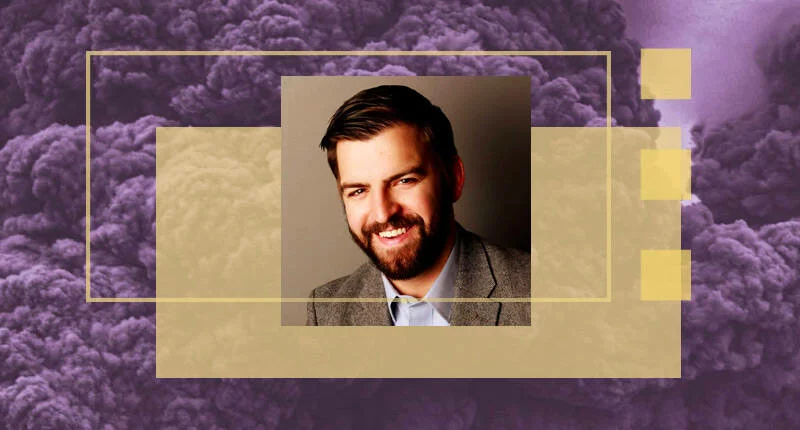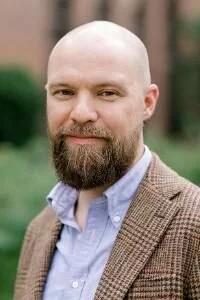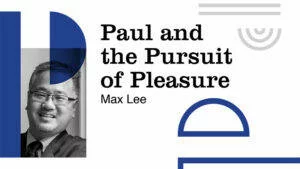In Adam’s fall we sinned all.
In spite of what this well-known pithy summary of the Christian doctrine of original sin might suggest, things are a bit more complicated.
Daniel Houck will be joining the Creation Project in the second year as a research fellow to explore how the thought of Thomas Aquinas provides helpful theological resources for thinking through the doctrine of original sin in light of advancements in evolutionary biology and population genetics.
The Third Way Forward
On the one hand, original sin plays an important role in Christian theology—it safeguards both the primordial goodness of the created order and the absolute goodness of the God who created it. It is also—as G.K. Chesterton famously observed—the only Christian doctrine that can really be proved. But on the other hand, recent advances in population genetics have led to a broad consensus that the current human population could not have all descended from a single ancestral pair. Given that the dominant stream in Western Christian reflection on original sin accounts for it through our direct decent from the original sinner Adam,Most contemporary theologians either deny original sin or attempt to defend the classical Augustinian perspective. Aquinas offers a third way. it looks like our two options are to either jettison the traditional doctrine or reject the current scientific consensus. And one can readily find contemporary theologians taking both these routes.
But Houck thinks there’s another way. “Most contemporary theologians either deny original sin or attempt to defend the classical Augustinian perspective. Aquinas offers a third way. He brilliantly proposed that original sin is ’sin‘ in an analogical sense.” Strictly speaking, sin in the fullest sense of the term is deliberate, active disobedience to God’s law—in this sense, all adults sin. However, infants don’t deliberately disobey God—but, Aquinas argues that they’re still sinners in a meaningful sense because they lack the Holy Spirit and will be separated from God until they receive him.
Anyone familiar with the life of Thomas Aquinas will recognize that this wouldn’t be the first time he helped theologians think through contemporary problems by rejecting what appears to be a choice between only two alternatives.See Michael Muarry’s evening lecture from the 2016 Dabar Conference. In fact, this is what drew Houck to Thomas—and the medieval period more broadly—in the first place. “The medievals gave epistemic primacy to Scripture as they understood it. Against Aristotle’s view that the world was eternal, for example, Aquinas cited Genesis and argued that it was created ex nihilo. At the same time, however, Aquinas strove to learn as much as possible from non-Christian interlocutors, from Plato and Aristotle to Avicenna and Maimonides.” It is this same approach—confidence in the truthfulness of Scripture and openness to dialogue with the claims of modern science—that Houck sees as the way forward through the contemporary debates.
Meeting Aquinas on the Road
Daniel first read Thomas in a history of philosophy course at Wheaton college during his undergraduate studies. “I was fascinated by his approach to fundamental philosophical questions, like the nature of being. Later on, I became convinced that Thomas’s approach to a variety of theological questions, especially in Trinitarian theology and theological anthropology, could contribute to contemporary theology.” This interest would continue through his graduate work—after completing a Masters of Divinity at Princeton Theological Seminary, Daniel enrolled in the PhD program at Southern Methodist University to study under Bruce Marshall.
It was at SMU that Houck landed on his current project: “I first became interested in original sin during a doctoral seminar on nature and grace in modern theology. In the twentieth century, a tremendous amount of attention was devoted to the relation between nature and grace. Is there a natural desire for the beatific vision? Is there an analogical relation between God and creation? Can we know anything of God by our natural powers?” What surprised Daniel was that—in spite of this rigorous and lively debate—comparatively little attention was given to original sin proper. “It seemed to me that a recovery of Aquinas’s account of sin might help us think through these issues in a new way.”
Houck notes that there have been recent evangelical accounts that argue a proper understanding of Adam’s role in Scripture does not entail believing that all subsequent human beings have descended from him. Yet what many of these accounts have difficulty explaining is the universality of sin—on these accounts, where did the sinfulness of the humans who did not descend from Adam come from? Did God create them sinful? And if so, how is God’s creation truly called “good”? Houck’s project aims to provide evangelicals with Theologians like Aquinas and Calvin who often offer theological principles that can be applied to problems they couldn’t have anticipated in their own daywith a theological account that gives compelling answers to these questions, and in so doing he will be giving a much-needed theological supplement to the work undertaken by a number of prominent evangelical biblical scholars.
Walking with the Church
Daniel sees the problem he is addressing as not merely academic: How to understand Adam, creation, original sin, and mainstream biology raise a host of questions that are among the most pressing issues facing the church today. Mainstream science is regularly viewed with suspicion within evangelical contexts, and evangelical scientists are often reluctant to raise the theological questions that arise form their work within their own churches. The resulting state of affairs is unhealthy for the church and for her scientists. And this, along with his academic interests in this field, is what motivates Daniel: a robustly evangelical account that gives priority to Scripture, takes seriously traditional theological formulations, and earnestly dialogues with the evidence and arguments of evolutionary biology in a way that would benefit not just the evangelical academy but the church as well.
Much like Gavin Ortlund’s project, Daniel sees the path to theological renewal as running through retrieval, constructively engaging the best of the church’s theologians and deploying their thoughts as resources for contemporary theological questions. “In addition to learning about the salient scientific research on a given question, there is no substitute for carefully reading great theologians from the past on one’s own.
Carl F. H. Henry Resident Fellows (2017 — 2018)
Marc Cortez, “Divine Presence”
Gavin Ortlund, “Retrieving Augustine’s Doctrine of Creation”
Stephen Williams, “Transhumanism, Robotics, and the Doctrine of Creation”
Daniel Houck, “Original Sin and Evolution: A Modern Thomist Account”
Nathan Chambers, “Created from Nothing: Creatio Ex Nihilo as a Framework for Reading Genesis 1”








Comments
Be the first one to make a comment!